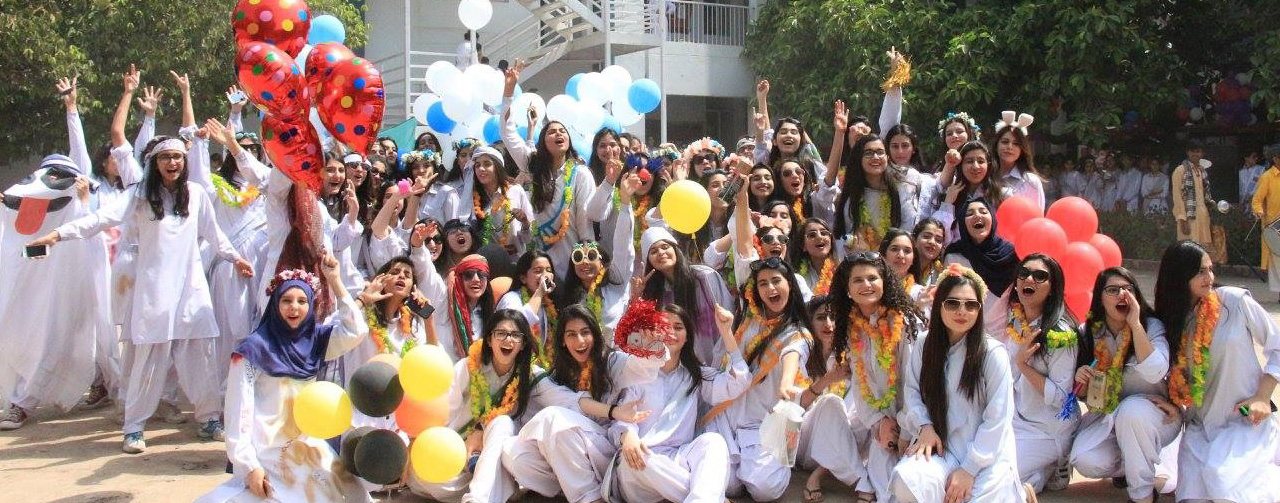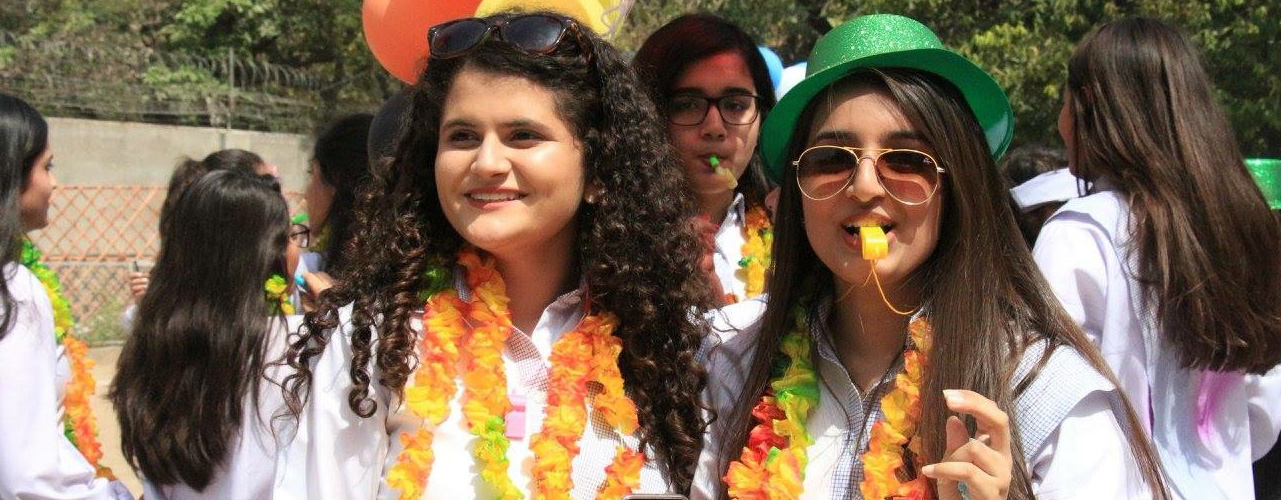SENIOR SCHOOL
Curriculum
In Class 8, the curriculum includes:
SUBJECTS
English Language and Literature
Urdu Language and Literature
Mathematics
General Science
Pakistan History (IGCSE 0448/01)
Pakistan Geography (IGCSE 0448/02)
Islamiyat (IGCSE 0493)
Punjabi
Art
Information Technology
Global Perspectives
Singing
Dance
Games
At this stage, all subjects are compulsory. Starting in Class 9, students may choose some of their subjects.
The compulsory curriculum for Class 9 includes:
English Language and Literature
First Language Urdu (O Level 3247)
Mathematics (IGCSE 0580)
Pakistan History (IGCSE 0448/01)
Pakistan Geography (IGCSE 0448/02)
Islamiyat (IGCSE 0493)
World History
Singing
Dance
Games
The elective subject choices available to Class 9 are broken into three groups:
Group 1: Physics (IGCSE 0625) or Additional Mathematics (IGCSE 0606) or Environmental Management (IGCSE 0680)
Group 2: Chemistry (IGCSE 0620) or Art and Design (IGCSE 0400) or World Geography (IGCSE 0460)
Group 3: Biology (IGCSE 0610) or ICT (IGCSE 0417) /CS (IGCSE 0417) or Sociology (IGCSE 0495)
Students are required to choose one subject from each group given above. If Art, ICT or Add Maths clash with another subject a student wishes to take, extra classes may be made available after school if at least 12 students wish to take the respective subject. Students may not be allowed to drop out of after school classes once they have been scheduled.
At the beginning of Class 10, students must finalise a minimum of 8 O-Level subjects. Compulsory subjects at this stage are:
First Language English (IGCSE 0500)
First Language Urdu (O Level 3247)
Mathematics (IGCSE 0580)
Pakistan History (IGCSE 0448/01)
Pakistan Geography (IGCSE 0448/02)
Islamiyat (IGCSE 0493)
In addition to the elective subjects offered in Class 9, Literature in English (IGCSE 0475), World History (IGCSE 0470) and Global Perspectives (IGCSE 0457) are available to Class 10 students as free-floating subjects that can be taken with any combination. To encourage that students develop some part of the strong thinking and communication skills that these three subjects help with, those who do not opt for these subjects as exam courses are enrolled in a mix of non-assessed Literature, non-assessed World History, and non-assessed Critical Thinking courses.
Our students appear for Cambridge exams in Pakistan Studies and Islamiyat at the end of Class 10 and for the remainder of their subjects at the end of Class 11. We are keenly aware of our responsibility to prepare students with the requisite skills and knowledge for these qualifications.
Most colleges, both in Pakistan and abroad, require student transcripts from Class 9 onwards, so it is very important that students approach these three years with seriousness. Students must sit for at least 8 subjects (5 compulsory and 3 elective) for their O Level examination in order to be eligible for the equivalency certificate from the Inter-Boards Coordination Commission (IBCC). We do not encourage students with foreign passports to exempt themselves from Pakistan Studies, Urdu or Islamiyat. Those determined to do so should refer to this document.
Any parent or student seeking additional information or advice on subject choices should make an appointment with Student Advising at the following email address: educationadvising@lgs.edu.pk

TRANSITION FROM O LEVEL TO IGCSE
At LGS 55 Main we think carefully about changes to the educational programme structure, balancing our educational philosophy with practical concerns about university admissions, local equivalence certification, exam registration fees, etc. In the past, we had opted largely for O Level qualifications, with the addition of a few IGCSE courses over the years. After a thorough comparison of the syllabi, beginning with the O Level batch of 2025, we have chosen to switch to all IGCSE courses, except for Urdu.
For more information about the differences between IGCSE and O Levels, please click here
FIRST LANGUAGE URDU
LGS 55 Main takes the position that all Pakistani students should be studying Urdu as a first language, and that is the only Urdu course we offer. First Language Urdu includes the study of both language and literature. A connection with our literary heritage is essential to developing a clear sense of who we are. Cambridge offers Second Language Urdu as an O Level course as well as an IGCSE course, but First Language Urdu only as an O Level. Until such time as Cambridge adds First Language Urdu to its list of IGCSE subjects, we will continue to offer the O Level course.
GLOBAL PERSPECTIVES, WORLD HISTORY, AND LITERATURE IN ENGLISH.
Our goal as a school is always to equip our students to live successfully in the real world. In an age where information flows ever more rapidly, abilities that are uniquely human become increasingly valuable. Success at solving seemingly intractable problems comes from being able to empathise, to take into consideration disparate points of view, and to find ways to make connections among seemingly unrelated ideas and events. The study of literature and history develops these skills. The individual report writing and team project work that goes into Global Perspectives trains students to get information from a range of sources and bring it to bear to make sense of longstanding conflicts, whether political, philosophical, or social.
So highly do we prize these subjects that we make sure students can opt for them, no matter what other elective subjects they take. We ensure that classes for them are held during the regular school day. We have found year after year that this choice is an academically worthwhile one.
In addition to the intrinsic value of pursuing these subjects, there are practical benefits as well. Universities share our view that these disciplines are valuable; students who have at least one of them find themselves at an admissions advantage. We hear from local universities about our students being better prepared to engage in the kind of critical thinking that their programmes require. Our experience is also that even among students who are intending to pursue futures in medicine, engineering, and technology, those who take up one or more of these subjects do better academically overall.
LEARNING WITHOUT ASSESSMENT
In addition to the courses that prepare students for Cambridge academic qualification exams, the curriculum at LGS 55 Main includes a number of courses essential to the holistic education that we so greatly value. These courses provide opportunities for students to learn in a variety of ways, without tying that learning to an artificial measurement.
The portion of our curriculum that is not subject to formal assessment includes both academic and activity-based courses.
GAMES, DANCE, MARTIAL ARTS, AEROBICS, MUSIC, LIBRARY
All students have Games lessons every week, barring a very few students who carry exceptionally heavy courseloads in Class 10. Maintaining a reasonable level of physical fitness is essential to good development and helpful to mental and emotional health.
In addition to the compulsory Games lesson, students of Class 8 choose from amongst dance, martial arts, aerobics, and games for a weekly activity period. This helps with their fitness as well as giving them an opportunity to explore a variety of ways of keeping their bodies active.
All our students have music (mostly singing) classes through Class 11. Our programme focuses on inculcating a love of our own culture and some understanding of the classical forms in our music.
The world is not divided into subjects and the wealth of knowledge and understanding that can be gained by reading outside of assigned school texts is impossible to quantify. Readers develop better communication skills in addition to being exposed to whole worlds that they may never experience firsthand. The education to be found in a library, should one avail the opportunity, is valuable, but also joyful.
CRITICAL THINKING, AUDIT LITERATURE, AUDIT WORLD HISTORY
Some students do not wish to take on the burden of exam assessment in additional subjects, and choose not to study Global Perspectives, Literature in English, or World History. To help them develop some portion of the skills gained from these subjects, the school arranges for them to take a mix of non-assessed courses.
Critical Thinking
Different teachers teach Critical Thinking classes each year. Teachers develop an individual course, usually taking into consideration the interests of the students in their teaching group. Each class becomes a reflection of the teacher’s own experiences, skills, and interests, in conversation with the students’ experiences, skills, and interests. The goal is always to have students engage with the world around them in thoughtful ways.
Audit Literature in English
Students who enjoy the analysis of literary texts in class discussion, but do not wish to sit for exams about them have the option to take an audit course. In some cases, students will attend the same classes as their peers who are preparing for the Cambridge examination. If a large enough number of students wish to audit, however, then a separate class is arranged, sometimes with an entirely different range of texts. Students learn how to engage with literary texts without having to prepare for assessment.
Audit World History
Students who enjoy reading about and discussing world history, but do not wish to appear for formal assessment in the subject, are permitted to attend regular World History classes as audit students. They are expected to do background reading and take part in classroom discussions and tasks but are not required to appear for tests or exams.
Lahore Grammar School aspires to create an environment where quality teaching and learning can take place. This environment, managed with fairness and firmness, promotes the growth and development of the whole person, allowing each student in our care to develop personally, educationally, and socially.
The aim of the Behaviour Policy is to safeguard both the students and the school environment. We want our students to respect the ethos of the school. There are six core values that the school has adopted: Respect, Tolerance, Honesty, Compassion, Responsibility, and Courage. It is our hope that these will serve as guiding principles for our students. We believe that good behaviour flourishes in an atmosphere of high expectations, support, guidance and encouragement.
We feel we would have succeeded in our mission if, when our students graduate, they are intellectually curious, involved with their community, and demonstrate strength and resilience
Aims of the Behaviour Policy:
• To promote good behaviour;
• To define and make clear school expectations;
• To ensure that every student is able to benefit from all that the school has to offer;
• To provide a framework within which students may develop their own skills and interests whilst becoming responsible, courteous and tolerant members of their school community and society;
• To apprise students, faculty and parents of the school’s response to any lapses in behaviour expectations; and
• To enable the Principal, Vice Principals, and members of Administration and Faculty to carry out their responsibilities in maintaining order and discipline in the school.
Code of Conduct
• We expect students to treat staff and each other with consideration and good manners.
• All behaviour should aim to support our core school values.
• Students are encouraged to respond positively to the opportunities and challenges of school life.
• Students are expected to be familiar with and follow the rules set out in the Uniform, Grooming, and Attendance Policy, the IT, Devices, and Social Media Policy, and the Anti-Bullying Policy.
• Students need to develop an awareness of right and wrong and an ability to differentiate between acceptable and unacceptable behaviour.
• Students should understand what is expected of them and why sanctions may be imposed for behaviour contrary to expectations.
• We expect students to be keen to learn and to participate in school activities and to ensure that they are not a barrier to others’ learning and participation in school life.
• All members of the school community: students, faculty and support staff, are expected to respect the buildings, furniture, equipment, and environment of the school.
• We expect students to behave at all times in a manner that reflects the best interest of the whole community.

Notice Board
Important Notices will be uploaded here whenever possible. However, please make sure that your current cell number has been entered in the School’s database as our primary means of communication with parents and students is via WhatsApp.



